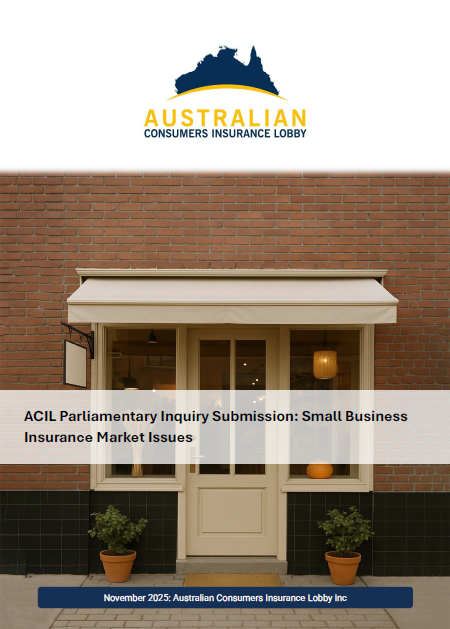Enough is Enough: ACIL Threatens Push for Publicly Appointed Assessors if Insurers Fail to Fix Expert Oversight
- tshandiman
- Jun 6, 2025
- 3 min read

The Australian Consumers Insurance Lobby Inc. (ACIL) has today responded to the latest ASIC directive (click here) urging home insurers to fix their oversight of independent experts and improve transparency on cash settlements, warning that if the industry fails to act, ACIL will begin advocating for government-sanctioned assessors and experts who represent the insured at claim time.
This is not the first warning. In July 2023, the General Insurance Code Governance Committee released a damning report that exposed serious concerns about the quality and reliability of expert reports relied on in claims decisions. While the industry responded by releasing a so-called “best practice” Expert Report Standard in 2024, the standard has failed to drive meaningful change. In practice, abuses persist and consumer outcomes remain compromised.
“We work closely with claims advocates at the coal face who are still seeing an alarming volume of biased and poor-quality expert reports,” said Tyrone Shandiman, Chairperson of ACIL. “The problem is systemic and deeply rooted in the way insurers engage, oversee, and influence the experts they appoint.”
While the industry’s 2024 Expert Report Standard was presented as progress, it has failed to deliver genuine reform. The document is riddled with out clauses and lacks teeth.
“One of the greatest travesties is that the Standard does not impose obligations on experts directly. Instead, it relies on insurers to ensure experts act properly. That’s like asking the fox to guard the henhouse,” Shandiman said.
Concerns around poor expert oversight are compounded by the ongoing mishandling of cash settlements. Despite clear recommendations from inquiries—such as PFI-13 from the flood inquiry, which called for fair uplift allowances to account for consumers managing their own repairs—insurers have failed to implement meaningful protections. Cash settlements are frequently offered without transparency, fall short of covering the true cost of repairs, and shift complex project management burdens onto policyholders. These practices leave consumers financially exposed, while insurers escape responsibility for ensuring fair outcomes.
ACIL has made issues associated with expert reports one of its core advocacy priorities. It has raised concerns about these issues and to date has only had dismissive responses from the Insurance Council of Australia (ICA), which failed to address the substance of the concerns or explain why these matters should not be dealt with in the General Insurance Code of Practice or the Expert Report Guide:
Direct interference by insurers in how experts assess claims, compromising independence;
Incentivised denials of claims through hidden performance metrics favouring reduced payouts;
Failure by experts to cite or apply relevant building codes, leaving consumers at risk of substandard outcomes;
Disregard for previously certified solutions, resulting in inconsistent and unfair determinations on defects;
Financial barriers to dispute—where even paying for a second opinion doesn’t shift the insurer’s stance, as they simply engage another expert to maintain a “two-to-one” advantage;
Conflicted ownership models, where related entities control multiple parts of the claims process including loss adjusters, engineering consultants, builders, restorers, and surveyors without disclosing this to the consumer;
Unsolicited maintenance recommendations, coercing consumers into unnecessary and costly works.
Despite years of feedback, media scrutiny, and regulator interest, meaningful reform has stalled. ACIL is in the process of writing to the Insurance Council of Australia to formally signal that unless there is real progress, it will advocate for independent, publicly appointed assessors who advocate for consumers in the claims process.
“Consumers deserve confidence in the experts who decide the fate of their claims. If the industry cannot deliver that, then the model must change—because right now, it’s failing the people it claims to serve.”



INDOVIP138
indovip138
indovip138
indovip138
indovip138
indovip138
indovip138
indovip138
indovip138
indovip138
indovip138
indovip138
indovip138
indovip138
indovip138
indovip138
indovip138
indovip138
indovip138
indovip138
indovip138
indovip138
indovip138
indovip138
indovip138
indovip138
indovip138
indovip138
indovip138
indovip138
indovip138
indovip138
indovip138
indovip138
indovip138
indovip138
indovip138
indovip138
indovip138
indovip138
indovip138
indovip138
indovip138
indovip138
indovip138
indovip138
indovip138
indovip138
indovip138
indovip138
indovip138
indovip138
indovip138
KSR88
KSR88 Link Alternatif
KSR88 Gacor
KSR88 Login
KSR88 MaxWin
KSR88 Terbaik
KSR88 Slot
KSR88
KSR88
KSR88 Link Alternatif
KSR88 Gacor
KSR88 Login
POCARI4D POCARI4D POCARI4D POCARI4D POCARI4D POCARI4D
TERMINALBET